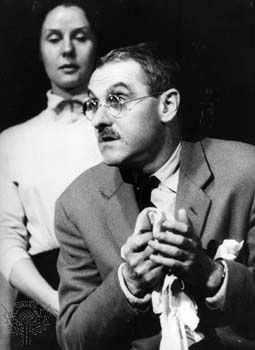Jean Anouilh
- In full:
- Jean-Marie-Lucien-Pierre Anouilh
- Died:
- Oct. 3, 1987, Lausanne, Switz. (aged 77)
- Notable Works:
- “The Lark”
Jean Anouilh (born June 23, 1910, Bordeaux, France—died Oct. 3, 1987, Lausanne, Switz.) was a playwright who became one of the strongest personalities of the French theatre and achieved an international reputation. His plays are intensely personal messages; often they express his love of the theatre as well as his grudges against actors, wives, mistresses, critics, academicians, bureaucrats, and others. Anouilh’s characteristic techniques include the play within the play, flashbacks and flash forwards, and the exchange of roles.
The Anouilh family moved to Paris when Jean was a teenager, and it was there that he studied law and worked briefly in advertising. At the age of 18, however, he saw Jean Giraudoux’s drama Siegfried, in which he discovered a theatrical and poetic language that determined his career. He worked briefly as the secretary to the great actor-director Louis Jouvet.
L’Hermine (performed 1932; The Ermine) was Anouilh’s first play to be produced, and success came in 1937 with Le Voyageur sans bagage (Traveller Without Luggage), which was soon followed by La Sauvage (1938).
Anouilh rejected both Naturalism and Realism in favour of what has been called “theatricalism,” the return of poetry and imagination to the stage. Technically he showed a great versatility, from the stylized use of Greek myth, to the rewriting of history, to the comédie-ballet, to the modern comedy of character. Although not a systematic ideologist like the Existentialist Jean-Paul Sartre, Anouilh developed his own view of life highlighting the contradictions within human reality, for example, or the ambiguous relationships between good and evil. He called two major collections of his plays Pièces roses (“Rose-coloured Plays”) and Pièces noires (“Black Plays”), in which similar subjects are treated more or less lightly. His dramatic vision of the world poses the question of how far the individual must compromise with truth to obtain happiness. His plays show men or women facing the loss of the privileged world of childhood. Some of his characters accept the inevitable; some, such as the light-headed creatures of Le Bal des voleurs (1938; Thieves’ Carnival), live lies; and others, such as Antigone (1944), reject any tampering with ideals.
With L’Invitation au château (1947; Ring Around the Moon), the mood of Anouilh’s plays became more sombre. His aging couples seem to perform a dance of death in La Valse des toréadors (1952; The Waltz of the Toreadors). L’Alouette (1953; The Lark) is the spiritual adventure of Joan of Arc, who, like Antigone and Thérèse Tarde (La Sauvage), is another of Anouilh’s rebels who rejects the world, its order, and its trite happiness. In another historical play, Becket ou l’honneur de Dieu (1959; Becket, or, The Honour of God), friendship is crushed between spiritual integrity and political power.
In the 1950s Anouilh introduced into his vision of the world the novelty of political ferment: Pauvre Bitos, ou le Dîner de têtes (1956; Poor Bitos). In the 1960s his plays were considered by many to be dated compared with those of the Absurdist dramatists Eugène Ionesco or Samuel Beckett. Le Boulanger, la boulangère et le petit mitron (1968; “The Baker, the Baker’s Wife, and the Baker’s Boy”) was coolly received, but in the following decade other new plays appeared to confirm his place as a master entertainer: Cher Antoine; ou, l’amour raté (1969; Dear Antoine; or, The Love That Failed), Les Poissons rouges; ou, Mon père, ce héros (1970; “The Goldfish; or, My Father, This Hero”), Ne réveillez pas madame (1970; “Do Not Awaken the Lady”), Le Directeur de l’opéra (1972), L’Arrestation (1975; “The Arrest”), Le Scénario (1976), Vive Henry IV (1977), and La Culotte (1978; “The Trousers”).
Anouilh also wrote several successful film scenarios and translated from English some works of other playwrights.














